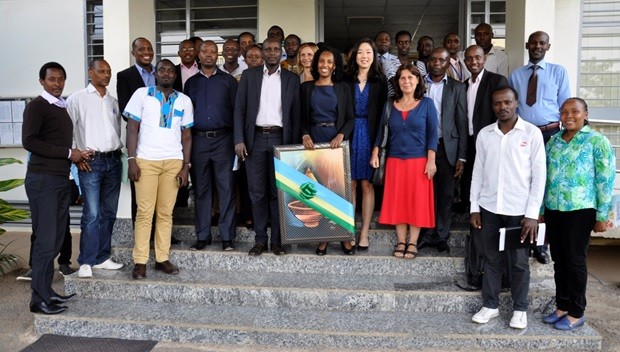Kigali 25th January, 2017- a National strategy to facilitate countrywide informal urban settlement upgrading has been validated by the Sector Working Group members of the Urbanization and Rural Settlement Sector at the Ministry of Infrastructure Headquarters.
The milestone meeting was chaired by the Director General of the Rwanda Housing Authority Eng. Didier SAGASHYA on behalf of the Permanent Secretary of the Ministry of Infrastructure and co-chaired by the Program Leader for Kenya, Rwanda, Uganda & Eritrea from the World Bank Ms. Meskerem Brhane.
The meeting was attended by representatives from different National government institutions, academia, the private sector, civil society and development partners.
The event concluded an extensive participatory consultation and drafting period, which included several stakeholder discussion meetings conducted by the Urbanization, Human Settlement and Housing Development Division of the Ministry of Infrastructure and Rwanda Housing Authority.
The final product is a home grown solution, the “National Informal Urban Settlement Upgrading Strategy”, taking into account a decade of consultation on the subject of informal urban growth in Rwanda, during which a strong policy foundation has been laid and important achievements have been implemented as a drive for the operationalization of the National strategy.
Urban upgrading is an important component promoted by the National Housing Policy (2015), which orients the existing informal housing unit to be upgraded and integrated into the formal housing stock to the highest degree.
The initiative recommends collaborative schemes based on the merging of resources as the way forward, which may enable individuals to participate in urban development and invest in neighborhood to accelerate economic status through improved housing improvement.
The Government is committed to facilitate such initiatives by providing technical and even financial support, when criteria of affordability and resource efficiency are fulfilled. For this purpose, it intends to create partnerships with educational institutions and professional bodies to assist in local urban planning development processes.
The initiative will uplift the civil society, which is essential for a good linkage to citizens and to mediate through complicated processes involving representatives of various interests and rights, such as property owners, tenants, developers, planning authorities and the general public in view of sustainability.
Informal urban settlements are a result of our intense history of urbanization in Rwanda, where people-centered planning is still slower than the rapid growth and large demand for affordable and well-serviced residential neighborhoods. The strategy offers solutions in order to rectify situations, where the built environment is not yet fit to provide good urban living conditions.
It counts on people-driven processes tailor made in response to specific neighborhood and location characteristics, and intends to encourage people to participate in the development of their land.
The strategy further acknowledges that urban development is mainly taking place in the private domain, and the foundation for economic growth which is private sector driven was laid by the concluded National Land Tenure Regularization after land reform.
Urban development is meant to be inclusive for every resident. The government intends to foster progress through facilitation of community-driven initiatives, while taking on the responsibility of public servicing with infrastructure, which is expected to unlock economic activity and private improvement.
The strategy offers five principles of upgrading implementation options such as Collaborative owners, private investors, central and local governments, social investment trust and development partners to enhance the urban development towards better transformation.
World Bank as one of the development partners approved a 95 Million USD loan to the Government which will be paid over the period of 5 years to finance infrastructure improvements in the Six Secondary Cities and in an informal urban settlement in Kigali.

 ENGL
ENGL KINY
KINY